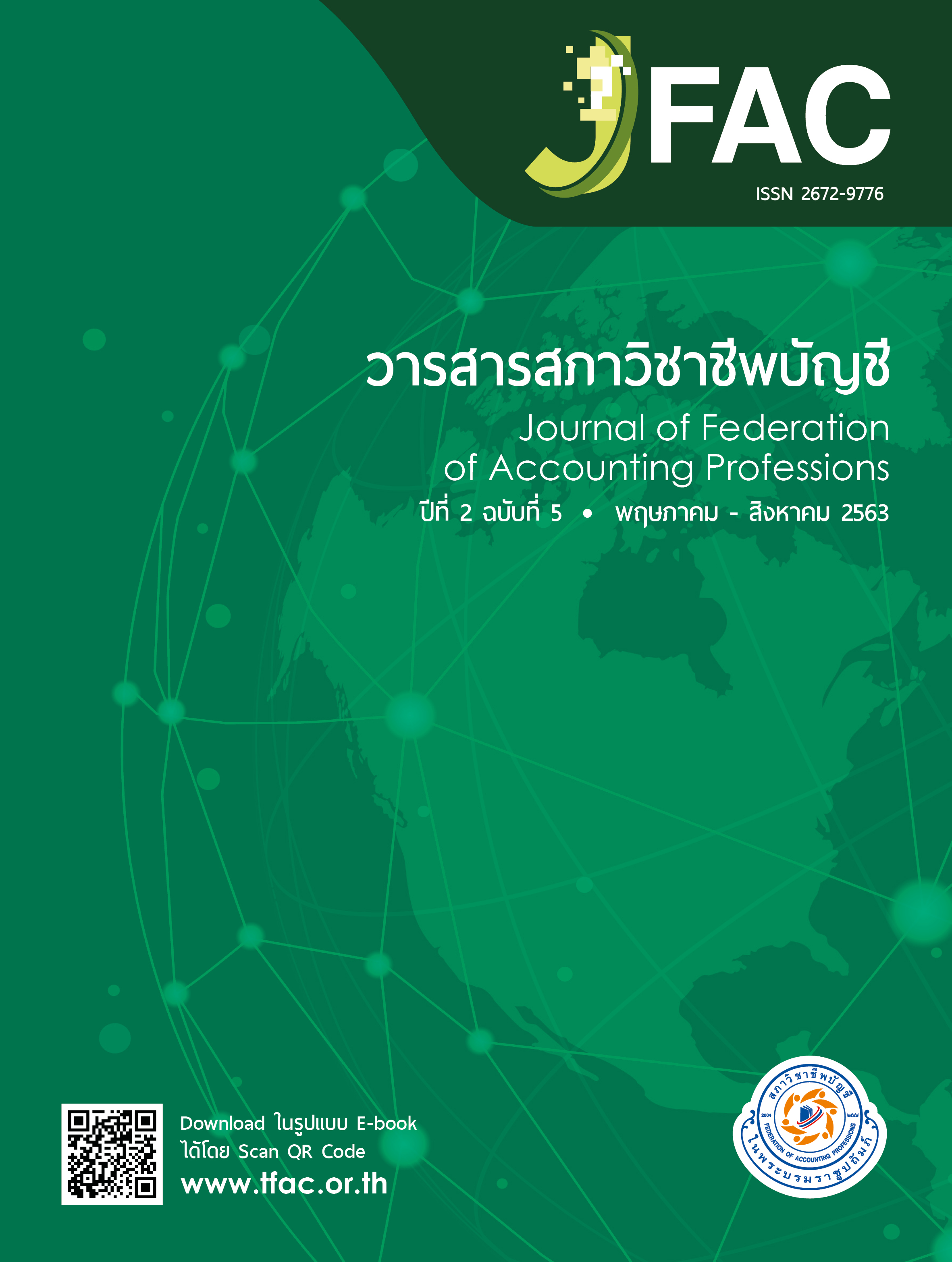THE AUDIT EXPECTATION GAP BETWEEN AUDITORS AND FINANCIAL STATEMENTS’ USERS
Main Article Content
Abstract
This independent study aims to study the expectation gap on auditing between auditors and financial statements’ users focusing on auditors’ roles and responsibilities, understanding of auditor's report, auditor independence and auditor’s liability. The study adopts a survey research using questionnaires as data collection tool. Both descriptive and inferential statistics; Mann-Whitney U Test, are used to analyse the data.
This descriptive result shows that in the overall, financial statements’ users are more likely to have higher audit expectation than auditors in all matters, especially understanding of auditor's report and auditors’ roles and responsibilities, while the least audit expectation is auditor independence. Moreover, at 0.05 significant level from hypothesis testing of expectation gap, the significant difference is understanding of auditor's report in which financial statements’ users expect auditor to disclose audit procedures in auditor’s report. Also, auditors are more likely to issue key audit matters in order to reduce their responsibilities in identifying material misstatements on financial reports. This study benefits to regulators who intend to reduce the audit expectation gap based on this present study.
Article Details
เนื้อหาและข้อมูลในบทความที่ลงตีพิมพ์ในวารสารสภาวิชาชีพบัญชี ถือเป็นข้อคิดเห็นและความรับผิดชอบของผู้เขียนบทความโดยตรงซึ่งกองบรรณาธิการวารสารไม่จำเป็นต้องเห็นด้วยหรือร่วมรับผิดชอบใด ๆ
บทความ ข้อมูล เนื้อหา รูปภาพ ฯลฯ ที่ได้รับการตีพิมพ์ในวารสารสภาวิชาชีพบัญชี ถือเป็นลิขสิทธิ์ของวารสารสภาวิชาชีพบัญชี หากบุคคลหรือหน่วยงานใดต้องการนำข้อมูลทั้งหมดหรือบางส่วนไปเผยแพร่ต่อหรือเพื่อกระทำการใดๆ จะต้องได้รับอนุญาตเป็นลายลักษณ์อักษรจากวารสารสภาวิชาชีพบัญชี ก่อนเท่านั้น
References
ศักรินทร์ ถิรธรรมพล. (2551). การเปรียบเทียบช่องว่างของความคาดหวังในการสอบบัญชีของผู้สอบบัญชีกับผู้ใช้งบการเงินในเขตจังหวัดสงขลา (การศึกษาอิสระปริญญาบัญชีมหาบัณฑิต, มหาวิทยาลัยบูรพา).
สาวิตรี อ่องธรรมกุล. (2547). ความคาดหวังที่มีต่อการสอบบัญชีในประเทศไทย (วิทยานิพนธ์ปริญญามหาบัณฑิต, จุฬาลงกรณ์มหาวิทยาลัย).
สภาวิชาชีพบัญชี ในพระบรมราชูปถัมภ์ (2562), ข้อบังคับสภาวิชาชีพบัญชี ว่าด้วยจรรยาบรรณของผู้ประกอบวิชาชีพบัญชี พ.ศ. 2561 (Online). แหล่งที่มา: http://www.tfac.or.th/Article/Detail/66981.
สภาวิชาชีพบัญชี ในพระบรมราชูปถัมภ์ (2562), คู่มือประมวลจรรยาบรรณของผู้ประกอบวิชาชีพบัญชี (Online). แหล่งที่มา: http://www.tfac.or.th/Article/Detail/66981.
สภาวิชาชีพบัญชี ในพระบรมราชูปถัมภ์ (2562), มาตรฐานการสอบบัญชี ปี 2562 (Online). แหล่งที่มา: http://www.tfac.or.th/Article/Detail/118586.
American Institute of Certified Public Accountants, Commission on Auditors’ Responsibilities (1978). Report, Conclusions and Recommendations. New York, NY.
Association of Chartered Certified Accountants (2019). Closing the expectation gap in audit. United Kingdom.
Boonyanet, W and Ongthammakul, S (2006). Expectation gap in Thai auditing society: Changes and comparison of its neighbors. Paper presented at XVIII Asian Pacific Conference on International Accounting Issues, Hawaii, USA, October 15-18, 2006.
Gunz, Sally and McCutcheon, John (1991). Some Unresolved Ethical Issues in Auditing. Journal of Business Ethics, 10(10), 777-785.
Lee, TH, Ali, AM, Gloeck, JD, Yap, CS, Ng, YL, Boonyanet, W (2010). The audit expectation gap in Thailand. The Southern African Journal of Accountability and Auditing Research, 10, 1-17.
Liggo, C.D. (1974). The expectation gap: the accountant’s Waterloo. Journal of Contemporary Business, 3, 27-44.
Olojede, Paul, Erin, Olayinka, Asiriuwa, Osariemen and Usman, Momoh (2020). Audit expectation gap: an empirical analysis. Future Business Journal. 6(10), 1-12.
Porter, B. (1993). An empirical study of the audit expectation-performance gap. Accounting and Business Research, 24, pp. 49-68.
Ruhnke, Klaus and Schmidt, Martin (2014). The audit expectation gap: existence, causes, and the impact of changes. Accounting and Business Research, 44 (5), 572–601.
Salehi, Mahdi (2011). Audit expectation gap: Concept, nature and trace. African Journal of Business Management, 5(21), pp. 8376-8392.
Turner, J, Mock, T, Coram, P and Gray, G (2010). Improving Transparency and Relevance of Auditor Communications with Financial Statement User. Current Issues in Auditing, 4(1), A1–A8.


